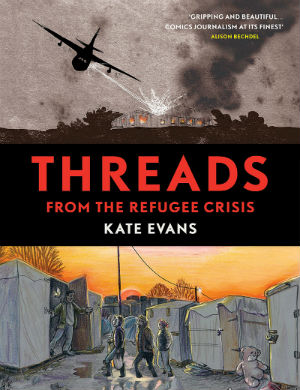
Threads is the story of the Calais refugees, and the growing crisis that the world ignores to humanity’s peril, writes Ellen Graubart

Kate Evans, Threads: From the Refugee Crisis (Verso 2017), 176pp.
Threads: From the Refugee Crisis is the unvarnished story, told in graphic form by a talented artist, of life in one of the refugee camps that grew up in and around the French port city of Calais, where having fled their homes because of famine and wars caused by the West, thousands of migrants and refugees gathered,inthe hope of being granted asylum in the UK. Many have travelled enormous distances and in great peril, fromcountries in the Middle East, north Africa and Afghanistan. Ninety-five percent are men who have had to choose between conscription, extermination or flight, but there are unaccompanied children living in the camps as well. There they wait in, in limbo, many of them risking their lives daily by attempting to walk through the Channel Tunnel or trying to board the cargo areas of lorries heading for ferries that cross the English Channel.
Kate Evans visited a refugee camp twice as a volunteer, armed with a sketch book with which to record the story. Her first experience of the camp, which had become known as the Jungle, was of an enormous, rat infested, rubbish strewn, shanty town, consisting of shipping containers and tents, with approximately one toilet per one hundred people, with no drainage, and drinking water that had been tested positive for faecal contamination. The refugees had no safety or privacy, and were constantly threatened and abused by the police and border authority, violently attacked by unidentified members of the French public, and forced to live in constant fear and insecurity.
Calais is a city famous for lacemaking which was done by women and girls twisting and weaving threads together, working outdoors to make use of all the hours of daylight. Evans has used images of this delicate material throughout, binding together the horrific aspects of this story – of squalor, brutality and dehumanization suffered daily by the refugees – with the love, human kindness and generosity shown by them and fellow activists.
Evans uses her considerable artistry and talent to tell one of the most tragic and shameful stories of modern times. It is a grim portent of what is to come if we do not begin to try and resolve the enormous problems facing us in these times of war and climate change, and the insecurity and chaos that inevitably accompany them.
There is nothing slick about her comic-book style of drawing which first appears to be rough, or perhaps crude; on the contrary, it comes across as straightforward and simply honest. Evans is a genius at depicting mood and character and sense of place. Her sense of humour, pathos and compassion, combined with anger that such a rotten system should prevail, are the threads that bind together this story. Threads is a vivid depiction of an enormous tragedy caused by humans against humans, for which no one has found or sought a solution. It is a heartbreaker – but is a work of art. I recommend this book to everyone.

